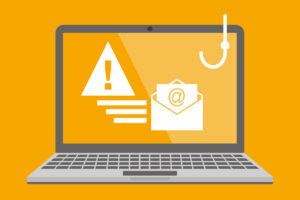Schlagwort: ‘phishing’
Spam or Phishing? How to Spot the Difference

Source: Own illustration
In keeping with today’s Safer Internet Day on February 10, 2026, this article is all about digital security. Spam and phishing emails show how important it is to remain vigilant in everyday life and to critically question suspicious emails. With a little caution and the right knowledge, you can better protect yourself — and the IT infrastructure of RWTH Aachen University.
Every day, we receive emails that are not always legitimate or welcome. Two types of unwanted communication are particularly common: spam and phishing. Both can be annoying, but phishing in poses a serious threat to your data.
In this article, you will learn how spam and phishing differ and how you can reliably identify suspicious emails.
Recognizing Phishing – Deceptively Real, Yet Highly Dangerous

Source: Own illustration
Why this topic matters
Phishing emails are among the most common types of cyberattacks- even at universities. Attackers attempt to obtain passwords, personal data, or access to systems by sending emails that appear deceptively legitimate.
These messages often look official: they contain logos, signatures, and sender addresses from well-known institutions such as RWTH Aachen Universitys. That is precisely what makes them so dangerous.
In this article, we will show you how such phishing messages are structured and what clues can help you recognize them early on. We will also present current examples from the RWTH so that you can better assess how genuine these emails often appear.
What Is Typosquatting?

Source: Freepik
The internet offers many opportunities – but also risks. One of the lesser known but potentially very dangerous threats in the field of cyber security is typosquatting. But what does this term actually mean? Typosquatting refers to a technique in which attackers attempt to redirect users to fake or unwanted websites. This is usually done by exploiting typos or similar domain names of well-known websites. Instead of the actual website, you end up on a page that looks deceptively similar to the real one or contains completely different, sometimes malicious content.
Halloween: The Nightmares of Cyber Security

Source: Freepik
Fear. A feeling that probably all of us are familiar with. Especially around Halloween, the potential for scares increases. Be it the fear of disguised, made-up figures or even the worry that your sensitive data will fall into the hands of unauthorized persons. Perhaps it’s no coincidence that October of all months is IT Security Month? In this article, we take a look at a few “IT horror stories”, how you can protect yourself from them and share some interesting figures.
QR Code Attacks
QR codes have become increasingly popular in recent years and are now used in almost all areas – whether in advertising, retail or public spaces. Especially since the Corona pandemic, QR codes have gained a lot of importance. For example, they made contact tracking in restaurants or contactless ordering in the catering industry possible. Many users appreciate QR codes because of their simplicity and the time they save, as they can be easily captured with a smartphone. At the same time, however, QR codes can also pose a threat to IT security. In this article, we’ll explain what you should always keep in mind when using QR codes.
Beware of Meeting Invite Phishing Scam!
The way we work together has changed fundamentally in recent years. Among the major changes is the shift of work processes to the home office. Not only have everyday tasks had to be shifted into virtual space, but also the entire communication process. This is how online meetings and video conferencing became a central part of our working lives. The digitization of these work processes brings many benefits. However, it also confronts many companies and organizations with major challenges. One of these challenges is the drastic increase in cyber attacks. As is so often the case, Internet fraudsters have taken advantage of the new situation and quickly developed a variety of new types of fraud methods. These include, for example, phishing attempts via appointment invitations.
Attention: Spear Phishing Emails in Circulation
In the last weeks, there have been more spear phishing attacks on RWTH email addresses. In this article, we would like to make you aware of these attacks and explain how you can recognize spear phishing emails. You have received a spear phishing email to your RWTH email address? We explain how you should best proceed. Read the rest of this entry »
Cyber-Security-Awareness-Training at RWTH – a Review

Source: Pixabay
No more simulated phishing emails in your inbox? No more access to the eLearning program for employees of the RWTH? That can only mean one thing: the cyber security awareness training at RWTH Aachen University ended for the time being on May 09, 2022.
Today we look back on the training and share the results with you. Read the rest of this entry »
Vishing: Stealing data on the phone

Source: Pixabay
Cyber-attacks are not just part of everyday life in companies. Even when opening our private e-mail inboxes, we occasionally encounter peculiar e-mails suggesting that the addressee is required to take urgent action. The e-mail urges the addressee to update personal data, enter account information for the payout of a reward, or click on links. Phishing is no longer unknown among fraud methods. However, the attacks are becoming more and more elaborate. Somewhat less known and therefore more surprising, however, are so-called vishing attacks. Fraudsters are coming up with a lot of new ways to obtain data from their victims. Read the rest of this entry »








